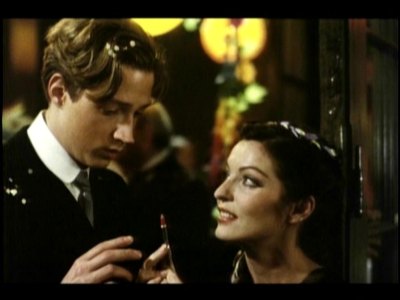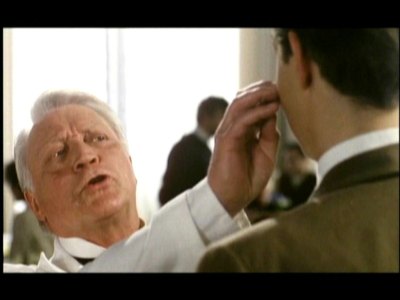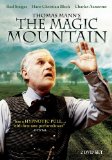| Reviews & Columns |
|
Reviews DVD TV on DVD Blu-ray 4K UHD International DVDs In Theaters Reviews by Studio Video Games Features Collector Series DVDs Easter Egg Database Interviews DVD Talk Radio Feature Articles Columns Anime Talk DVD Savant Horror DVDs The M.O.D. Squad Art House HD Talk Silent DVD
|
DVD Talk Forum |
|
|
| Resources |
|
DVD Price Search Customer Service #'s RCE Info Links |
|
Columns
|
|
|
Magic Mountain, The
It's two little words, E1 Entertainment: "Paul Mavis." "DVD Talk" didn't write those quotes you put on the front and back covers of The Magic Mountain, I did. Sigh. Well, as I suspected when I reviewed Buddenbrooks, the two remaining films in that previous Koch Vision set, The Thomas Mann Collection (The Magic Mountain and Doktor Faustus), have now been released separately. If you already own that set, there's no need to double dip here: the same transfers are used, and no additional bonuses have been included. However, if you're interested in Mann or the actors featured here, I can't recommend these particular versions highly enough. Since this is the exact same transfer of The Magic Mountain, I'll port over my previous review.

Hans Castorp (Christoph Eichhorn), a recently graduated engineering student on his way to Hamburg where a job building ships awaits him, takes a brief vacation to Dalvos in the Swiss Alps, where his cousin Joachim Ziemben (Alexander Radszun), suffering from TB, is staying at a lung clinic. Almost instantaneously losing track of time, as well as the will to continue on with his life and career, Hans settles into living permanently at the clinic. This decision is reinforced by the clinic's director, Doctor Behrens (Hans Christian Blech), who immediately diagnoses Hans with anemia and almost certain TB.
Slipping into a deeper and deeper dependency on the clinic's insular, safe world, where illness is celebrated, Hans becomes immediately captivated with Clawdia Chauchat (Marie-France Pisier), a beautiful Russian patient who stays at the clinic more out of avoidance of her marriage, rather than any real illness. Alternately taken with, and contemptuous of, her infatuated suitor, Clawdia eventually allows Hans to sleep with her, before departing for another sanatorium. In the meanwhile, Hans' Uncle James (Helmut Griem) arrives from "the flatlands," hoping to return Hans to the real world. But James sees immediately the strangely debilitating effects of staying at the sanatorium (he's immediately diagnosed with the exact same condition that Hans received from Dr. Behrens on his first day of visiting Joachim), and leaves the very next morning. Freed from any worries now about returning to his former life, Hans settles in happily for a life as an invalid.
Not giving up on his romantic obsession with Clawdia, Hans literally waits years for her to return to the sanatorium, only to find upon her arrival that she has a traveling companion, Mynheer Peperkorn (Rod Steiger), a hedonistic consumptive who graciously (and paternalistically) offers Clawdia to Hans again. Just as Hans celebrates his seventh year at the clinic, WWI rudely interrupts his life of suspended animation, forcing him to leave the soon-to-be shut down clinic.
Thomas Mann famously refused to be specific about any definitive literary interpretation of The Magic Mountain, but from what I can remember of what I read (I attempted it back in college, but failed), it's a book so loaded with symbolism, detail, and an epic, ironic scope dealing with multiple themes, that you can pretty much bring to it what you'd like in your reading experience. It's weighty enough for multiple interpretations and readings. The film version settles for a focused look at the mental deterioration of Hans, with an almost supernatural take on the debilitating effects of the sanatorium. Playing at times like a low-key Bavarian The Shining, screenwriter and director Hans W. Geissendorfer maintains a discreet distance from the melodramatics, allowing the funereal mood of the piece to settle in most uncomfortably, until we the audience are constantly looking for signs of a new consumptive case. So successful is Geissendorfer in creating a horror-like atmosphere of the sanatorium, when Hans' uncle arrives to rescue him, we want to yell, "Get the hell out of there!" And sure enough, Uncle James immediately succumbs to the succubus nature of the lung clinic, before wisely hightailing it out of there.
The acting in The Magic Mountain is particularly good, with young Eichhorn quite nicely essaying a difficult, complex role. Pisier is beautiful and seductive, of course, but she also gets across the essentially selfish nature of the character perfectly. And veteran Blech as the director of the clinic (you've seen him in a hundred WWII movies, at least), is marvelous as the shady doctor who cynically sees disease everywhere. The only stumbling block is Steiger's portrayal of Peperkorn. Steiger never met a ham he didn't try to eat or imitate, and his over-the-top performance really goes off kilter in an embarrassing scene in a restaurant. Exhibiting the worst of his stock mannerisms (the hands covering his face, the eyeball-rolling, the screams trailing off into whispers), Steiger may be playing a hedonist here, but he goes over like a deranged lunatic. Fortunately, he's not in the film long, and The Magic Mountain has time to recover before its well-executed conclusion.

The DVD:
The Video:
Strangely, the back of the DVD hardcase holder indicates this film is full-screen, 1:33:1. It isn't (someone needs to either check the copy or learn about aspect ratios). The non-anamorphic, 1.78:1 (which sometimes fattens to 1.66:1 from haphazard cropping) letterboxed video image for The Magic Mountain is not particularly good, with a dark, dark print, and quite a few scratches and dirt specks. Colors are faded, and at times, the blacks didn't hold true. And again, just as in the Buddenbrooks and Doktor Faustus transfers, there's a distracting PAL to NTSC conversion frame stutter during busy camera movement (although it's not nearly as bad here as it is in Buddenbrooks).
The Audio:
The Dolby Digital mono soundtrack is only adequate, but thankfully, the English subtitles keep pace with the original German dialogue track.
The Extras:
There are no extras for The Magic Mountain.
Final Thoughts:
With an emphasis on lurking horror behind the doors of a supernaturally animated lung clinic, ready to spread its evil and ennui to unsuspecting visitors, this film adaptation of The Magic Mountain has a hypnotic pull to its dramatic design. Aided by first-rate performances and a startlingly clear vision of the psychotic appeal of false nobility and self-destruction through illness, The Magic Mountain provides a memorably unsettling viewing experience. I highly recommend, even with the fair-to-middling transfer, The Magic Mountain.
Paul Mavis is an internationally published film and television historian, a member of the Online Film Critics Society, and the author of The Espionage Filmography.


|
| Popular Reviews |
| Sponsored Links |
|
|
| Sponsored Links |
|
|
| Release List | Reviews | Shop | Newsletter | Forum | DVD Giveaways | Blu-Ray | Advertise |
|
Copyright 2024 DVDTalk.com All Rights Reserved. Legal Info, Privacy Policy, Terms of Use,
Manage Preferences,
Your Privacy Choices | |||||||













